Those of us who have a penchant for rich, pristine flora and fauna know the deep yearning to experience unadulterated nature as often as we could. Given the choice, we would rather be at a place where time seem to stand stock-still, you could literally hear your own heart beating. Well, almost.
For some in fact, life in the city no longer had the allure it once did, prompting them to move to another locale that offers a completely different experience and lifestyle. I watched the YouTube video https://www.youtube.com/watch?v=3jh1481J6qw which features Andrew Martin, a former finance expert, and his wife working on a five-acre permaculture farm in New Zealand. “I felt this void in life, like, there’s something missing,” said Andrew in the video. “I had to get away, to connect with nature. . . When I wake up every morning [now], I don’t have that void anymore. Instead, I got this instant connection and satisfaction.”
Closer to home in Paya Jaras, Sungai Buloh, Malaysia, I spoke to the husband-and-wife team, Encik Muhammad Rizal bin Azmi (34) and Puan Ernadia Os’hara binti Omar (32), warmly known as Nadia, of LifeProject, a permaculture affair they had dived whole-heartedly into, together with their 3 young children.
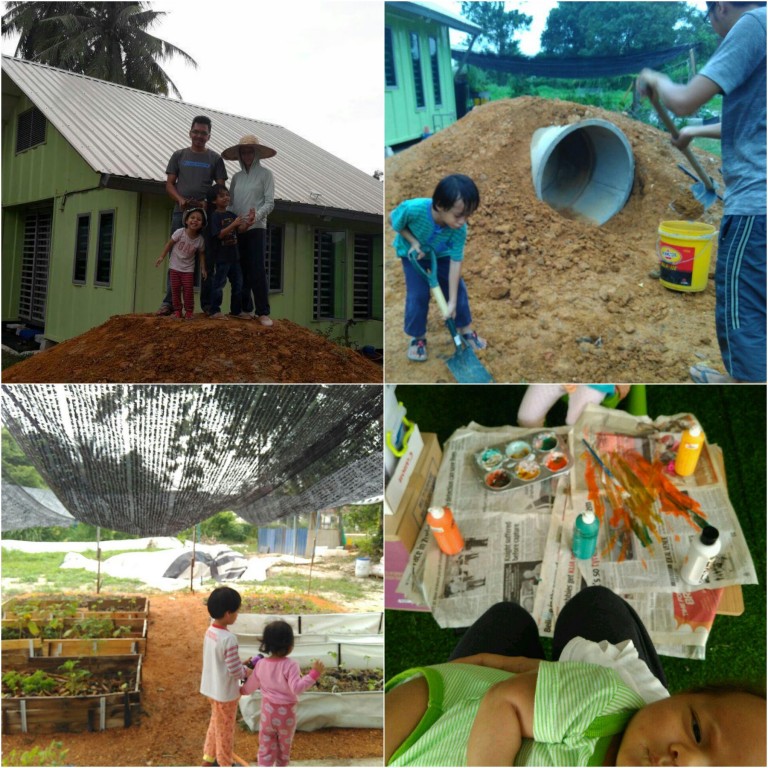 Encik Rizal and Puan Nadia relishing the new lifestyle they have adopted together with their children: five-year-old Haykal Azmi, Julia (3 years) and Alam (3 months).
Encik Rizal and Puan Nadia relishing the new lifestyle they have adopted together with their children: five-year-old Haykal Azmi, Julia (3 years) and Alam (3 months).
Jamilah: Tell us your personal and professional backgrounds.
Nadia: I’m the youngest of 4, I grew up doing competitive gymnastics. What started as a play gym ended up with me representing the country for almost my entire childhood, with my last tournament competing at the XVI Commonwealth Games in 1998 here in Kuala Lumpur.
I took a Diploma in Architecture and Bachelor of Science (Hons) Architecture where I received both LAM Part I and Part II at Universiti Teknologi Mara (UiTM). Later, I received a scholarship offer to pursue Masters & PhD, however I took a break from studying to start a family with Rizal. And that’s when the parenthood journey began. I graduated as an architect, and now I am advocating on birth, breastfeeding, and natural parenting.
Rizal: I grew up in a small family with 2 siblings and I’m the younger of the two. Not actually sure what to pursue, I took up Electrical & Electronics Engineering in Universiti Teknologi Petronas (UTP) after high school. Upon graduation, I worked in the manufacturing industry as a production engineer for 3 years followed by the power industry for 7 years in business development. After 10 years of corporate life, I decided to continue learning hands-on, diving into permaculture and advocacy with Nadia and our family.
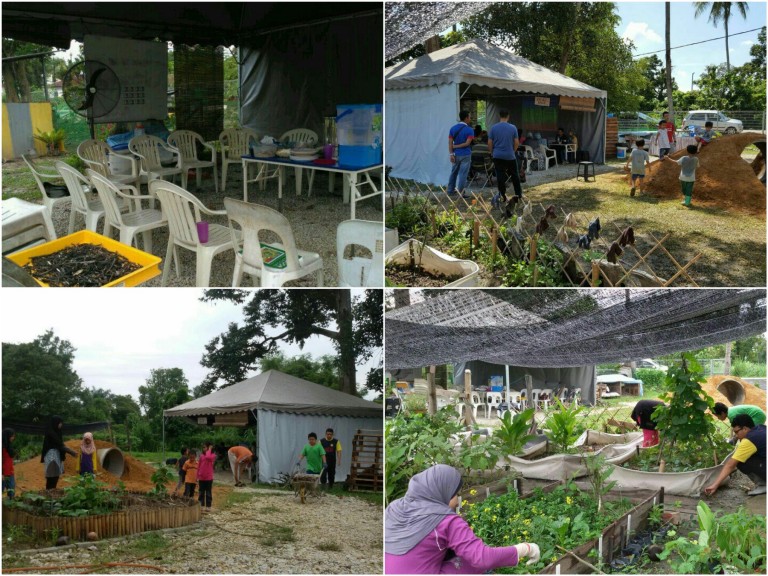 Much has been accomplished by the family within the relatively short time they have set up Life Project.
Much has been accomplished by the family within the relatively short time they have set up Life Project.
Jamilah: Tell us about permaculture, what got you into it?
Nadia: I first heard about permaculture in a cooking show on television, where this restaurant had their own supply of veggies from their own garden. However, in their garden, the produce were not planted in typical rows, but rather they mimic the natural undulating landscape instead. They also planted other diverse plants on the plot to attract beneficial insects or repel pests. We found that concept simply amazing and thought, nature has already put things in place all these while! The natural system is a library of solutions for us to learn from, not just limited to gardening but anything systematically.
Rizal: We looked up further about Permaculture on the internet and later was very much delighted to find several Permaculture Design Certificate (PDC) courses conducted here in KL. But because Nadia was a stay-at-home mum to a fully breastfeeding infant and I was working full-time in the corporate sector then, we were not able to attend the 14-day course. Luck was on our side though, as there was a part-time PDC course offered back in 2012, which was when our firstborn was already a little older. It was held only on weekends and stretched to 3 months for completion.
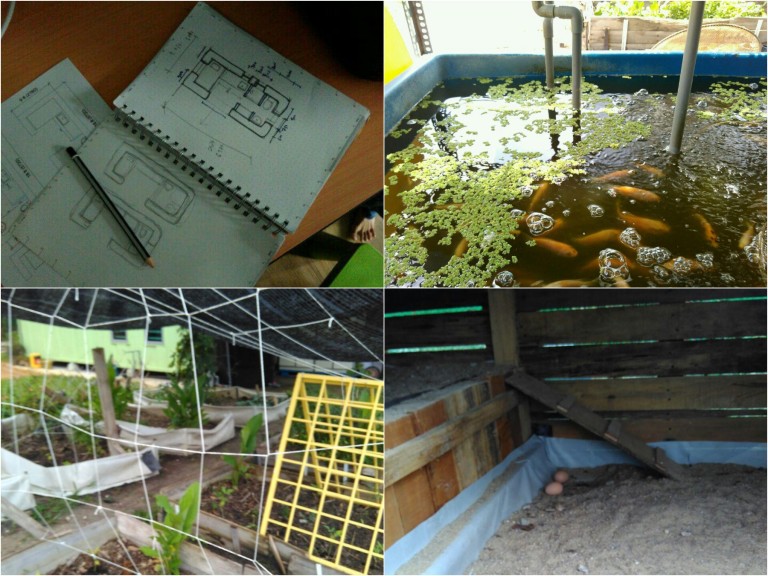
It took a lot of careful planning and painstaking effort before the family could wake up daily to their own pond teeming with live fish, poultry and varied vegetables.
Jamilah: How has permaculture impacted your life?
Nadia: It has made me look at things in its entirety. As a first time mum (at that point), I was also taking baby steps in a journey from the beginning. Raising a baby slowly expands my understanding about permaculture. From learning about how a tiny person grows, his nutritional needs, human development, etc, we were also faced with a concern about our children’s future that seems to be beyond our capacity to control, like climate change, economic instability, increasing stress-related illnesses, high crime-rates and so much more. Still, nothing emerges on its own. I believe they are interrelated. But that’s the current challenge, to do things wholly takes time but we are working towards it, at least the mindset that we wish our children to understand and carry on if we don’t live long enough to see the change.
Rizal: Permaculture has taught us to think differently and look at things more holistically and systematically. There is no single solution to a particular issue and has to be addressed in totality. And we believe that it could also bring about a positive impact to the people around us, hence our decision to promote and advocate its principles.
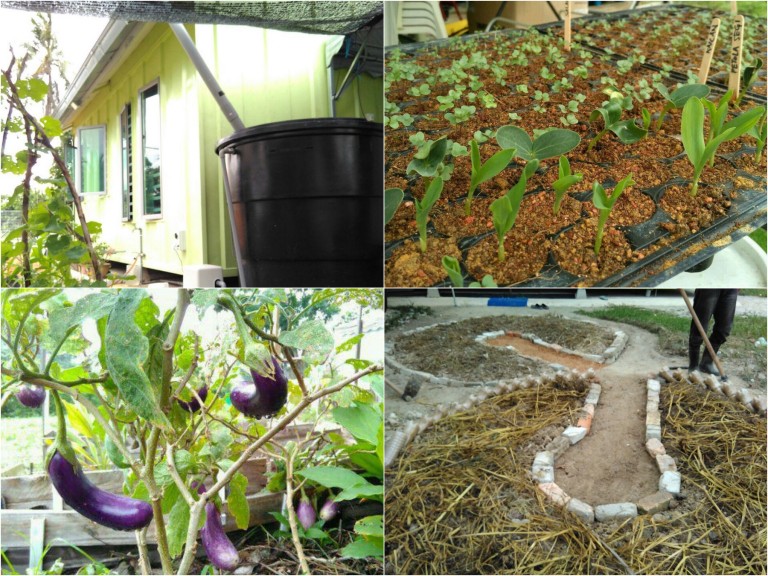
What is farmed ends up on the dinner table, while extras can be sold at nearby outlets or generously given away to friends, family or neighbours.
Jamilah: Who influenced you to be involved?
Rizal: We were very much inspired after seeing the video “My Family Project” by Thirasak Tanapatanakul, a dad who works in the advertising industry in Bangkok, Thailand. It shows how consumerism has impacted his sons’ well-being, pushing them build a new life. Another one was a short video of Jon Jandai at TedX talk. Jon Jandai founded Pun Pun Center for Self-Reliance, an organic farm outside Chiang Mai. Almost immediately after, we made our own itinerary to visit the both of them (that was how inspired we were!) in Thailand, where we met Jon Jandai in person.
Nadia: Later after taking our PDC course we met more like-minded people in permaculture. Our parents, too, have been supportive. But it wasn’t until around May 2016 that we were able to put into practice what we learned by moving into a 1/4 acre land in Sungai Buloh and began Life Project, a family-led organization which intends to advocate permaculture and its branches.
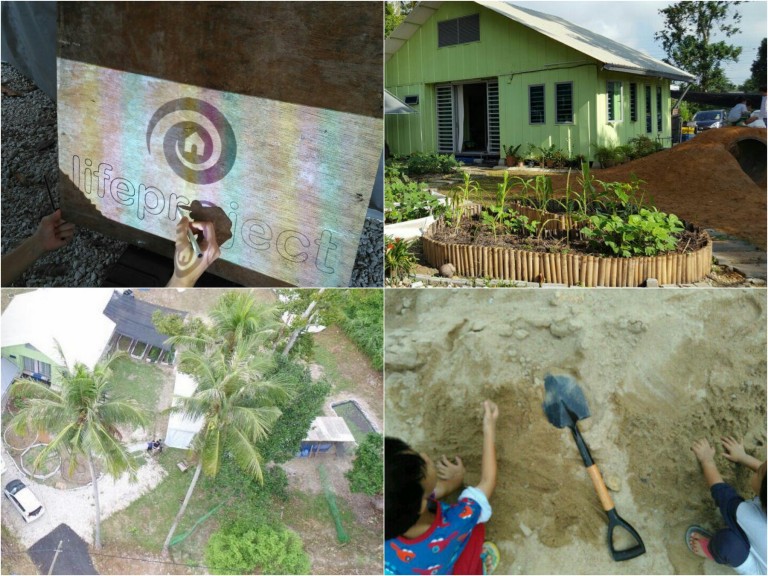
The children love the outdoors, where nature provides an excellent learning environment. Curiosity is endlessly entertained, a stark contrast to being cooped up within the four walls of one’s home.
Jamilah: Do you know many others who are into permaculture?
Nadia: We first met other people in permaculture through Eats Shoots and Roots. We also got to know others from Murujan Permaculture, Ecocentric Transitions, and Urban Hijau.
Rizal: Some of our friends from PDC established a community garden called TTDI Edible Project. There’s also DQ Farm, a free-range organic chicken farm using Permaculture principles. There’s more but these are a few that we have personally met. Compared to other countries, and the potential for Malaysia being in the tropics, we are still in the beginning but we are growing with more people getting involved.
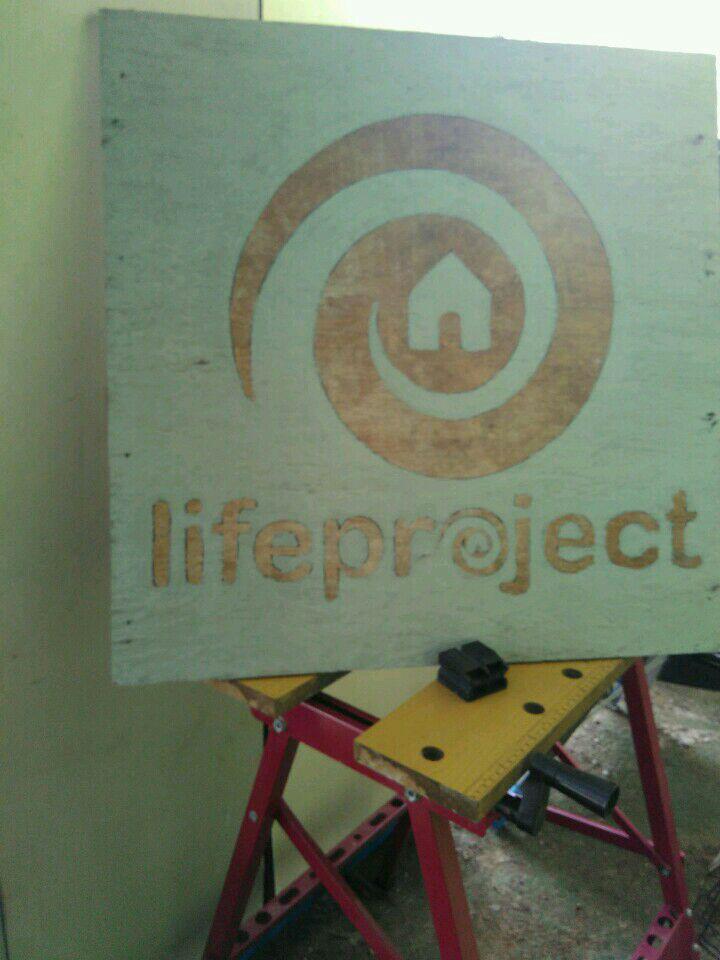
Life Project’s logo sits proudly on an aisle. The symbol of one family’s journey to live their shared dream.
Jamilah: Was this something you thought of prior to your marriage?
Nadia: Not at all! Having a baby, the way we look at things simply has changed. We were gradually exposed to natural and gentle birthing and realised that other aspects of our lives are not so natural either. We explored other areas – food, parenting, gardening, housing – and in the end we found the principles of permaculture which is holistic and encompasses the entirety of our lives.
Jamilah: How has it helped you as a family?
Rizal: We are starting to be more mindful with our resources and our lifestyle. Sometimes we feel that as an individual or a small family, we may not contribute much impact, but if we look at things in its entirety, it does. One notable difference is after we moved to Sungai Buloh, we could see a significant improvement in the behaviour of our first born. He wasn’t used to being outdoors and would cringe even when he dropped a single sweat. Now he tends to the chickens and does intensive shovelling of soil without worrying about dirt and sweat.
Jamilah: Any other comments?
Nadia: We believe that permaculture is for everyone.
Rizal: Individuals, family and community . . . Permaculture can be applied at any scale, big or small.










